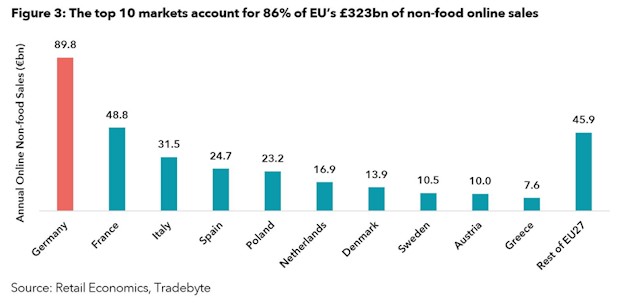Economics research consultancy Retail Economics and direct-to-consumer e-commerce platform Tradebyte have revealed research showing that British brands and retailers have seen sales to the EU plummet £5.9bn since Brexit, despite a flourishing European e-commerce market.
Online retail is estimated to add £323bn of annual sales to EU economies, but additional trade frictions caused by Brexit-related complexities are curtailing this international sales opportunity for UK-based brands and retailers. The value of non-food retail exports has fallen by almost 18% since 2019, despite inflation softening the decline.
The study shows that the UK’s non-food export environment, particularly in the Clothing & Footwear sector, has faced significant challenges post-Brexit. Exports in this category have dramatically declined, falling from £7.4m in 2019 to just £2.7bn in 2023. This sharp drop is said to have put considerable pressure on brands and retailers lacking the necessary expertise, resources, or financial capacity to navigate the complexities of the new regulatory landscape.
These challenges include escalated logistics costs, the complications of registering an EU entity for trading, and increased delays in an already fiercely competitive market characterised by tight profit margins and the need for rapid response to the latest trends.
The research highlights how the new trading relationship with the EU has shifted operations. Apparel pre-Brexit was a top three exporter for non-food retail, but now Health & Beauty, Electricals, and DIY & Gardening make up three-quarters of UK retail exports to the EU. Health & Beauty and DIY & Gardening are the only two categories that have seen a marginal increase in export values since 2019.
Amidst the export challenges, online opportunities across Europe have accelerated since the pandemic, with marketplaces emerging as pivotal platforms for UK brands and retailers to mitigate the impact of Brexit.
Online marketplaces, which now account for over two-fifths of the EU’s £322.6bn annual online non-food sales, offer a streamlined path to access affluent and younger consumer demographics. The concentration of sales among the largest EU markets means the top 10 online markets account for the lion’s share of non-food online sales (see below), with marketplace sales alone accounting for at least £133bn of EU e-commerce.

“The profound shift in the UK’s trade relationship with the EU has hit British brands and retailers hard. Successive waves of disruption caused by Brexit and the pandemic have significantly disadvantaged UK exporters who are having to navigate through increased friction and cost,” commented Richard Lim, CEO of Retail Economics.
“Marketplaces have emerged as a lifeline to tap into the EU market, which now account for over half of online sales among the most affluent young and middle-aged EU consumers. As UK retailers search for expansion into new territories, marketplaces have emerged as an important channel for growth, opening up new scalable market opportunities at low risk.”
Alexander Otto, Head of Corporate Relations at Tradebyte, added: “International retail is a complicated space to be in, particularly for UK brands and retailers looking to sell in Europe post-Brexit. From language barriers to taxation and customs issues through to warehousing and fulfilment, these are not small obstacles to overcome.
“In today’s marketplace landscape, access to relevant customer data, an intuitive understanding of the market, relevant experience and knowledge of current trends and an effective fulfilment strategy is critical to success.”
NAM Implications:
- No surprises here, surely?
- Shifting the good stuff to online, has to be an opportunity…
- …while the costs and aggravation associated with the challenges including:
- Escalated logistics costs
- The complications of registering an EU entity for trading
- And increased delays..
- …have to be a long-term deterrent to traditional trading.
- i.e. go online before the opportunity window closes…
- (Brexit was always more about sovereignty than trading, anyway…)



